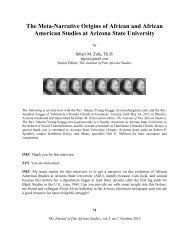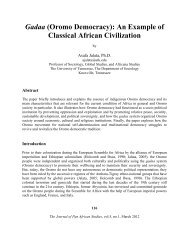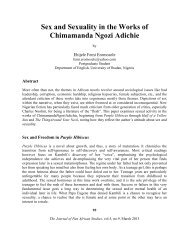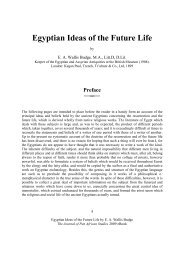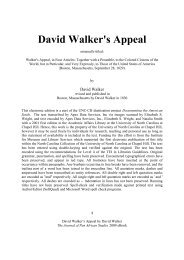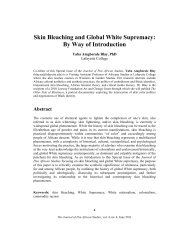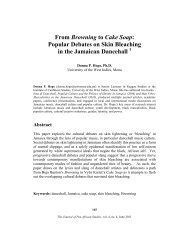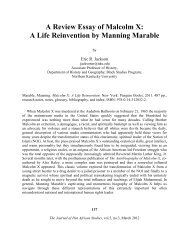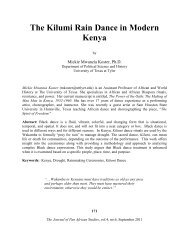view PDF - Journal of Pan African Studies
view PDF - Journal of Pan African Studies
view PDF - Journal of Pan African Studies
You also want an ePaper? Increase the reach of your titles
YUMPU automatically turns print PDFs into web optimized ePapers that Google loves.
Political Dialoguing Through the Naming<br />
Process: The Case <strong>of</strong> Colonial Zimbabwe<br />
(1890-1980)<br />
by<br />
Magudu Snodia<br />
srmagudu@yahoo.com.au<br />
Tasara Muguti<br />
tasaram@cooltoad.com<br />
&<br />
Nicholas Mutami<br />
nicholas.mutami@yahoo.com<br />
Great Zimbabwe University, Masvingo, Zimbabwe.<br />
Abstract<br />
The colonisation <strong>of</strong> Southern Rhodesia (Zimbabwe), like that <strong>of</strong> several other colonial <strong>African</strong><br />
nations at the time, was characterised by tension and antagonism between the settlers and the<br />
indigenous people. This paper argues that in Southern Rhodesia, one <strong>of</strong> the ways antagonism was<br />
reflected was through the naming process, which started immediately after the occupation <strong>of</strong> the<br />
country by the British South <strong>African</strong> Company (BSAC) and continued until national liberation in<br />
1980. Hence, the settlers used the naming process to assert their claim and authority over the<br />
newly acquired space, while the indigenous people, where possible, employed it to communicate<br />
their displeasure with all that the new political dispensation represented.<br />
16<br />
The <strong>Journal</strong> <strong>of</strong> <strong>Pan</strong> <strong>African</strong> <strong>Studies</strong>, vol.3, no.10, September 2010
Introduction<br />
Southern Rhodesia was occupied by the British South <strong>African</strong> Company (BSAC) on behalf <strong>of</strong><br />
the British government in 1890. Thereafter, the political and socio-economic relations that<br />
developed between the white settlers and the <strong>African</strong> people in the new colony were<br />
characterised by tension. In addition to enacting legislation calculated to force the <strong>African</strong> to<br />
accept settler authority, they also used indirect methods to constantly remind the people that they<br />
were now a subjugated people.<br />
One such indirect method employed by the settlers was ‘language and cultural imperialism’<br />
through the naming process as reflected in the typo and anthroponyms used by the antagonistic<br />
groups in the colony. Names bestowed on places, rivers and infrastructure such as buildings,<br />
schools, hospitals and roads by the settlers were meant to convey specific political messages,<br />
hence, an expression <strong>of</strong> their political victory and “an important part <strong>of</strong> the act <strong>of</strong> claiming and<br />
confirming possession over space” (Jarman, 1996, cited in Makondo, 2009:30). About the same<br />
time, where it permitted, the different groups <strong>of</strong> indigenous people also talked back through<br />
names <strong>of</strong> mines and farms including those <strong>of</strong> children, to express their resentment towards the<br />
establishment <strong>of</strong> colonial rule, an event that was characterised by extensive plundering <strong>of</strong> local<br />
resources and exploitation <strong>of</strong> the <strong>African</strong> people.<br />
This paper seeks to demonstrate that the settlers and the indigenous people both used the naming<br />
process as an informal political dialogue to express their antagonistic relationship that<br />
characterised the interaction. Thus, we will demonstrate that initially, the bestowing <strong>of</strong> names<br />
was a political monologue by the settlers, but later, it became a dialogue as the <strong>African</strong>s became<br />
conscious <strong>of</strong> the significance <strong>of</strong> names in expressing resentment to white rule.<br />
The Functions <strong>of</strong> Names<br />
The basic function <strong>of</strong> names has been that <strong>of</strong> providing a useful label to things so that they can<br />
be differentiated. However, it is now widely accepted that there is more to the naming process<br />
than that basic function as these have social and psychological functions (Finnegan, 1970;<br />
Hudson, 1980; and Turner, 1992). The social function is reflected in the varied reasons for<br />
choice <strong>of</strong> names which include sentimental, literary, religious and cultural reasons. In the cultural<br />
realm, names are significant in providing cultural identities, preserving a people’s history and<br />
transmitting from generation to generation that which makes them distinct, thus making them an<br />
extension <strong>of</strong> the structure <strong>of</strong> society. For example, as noted by Neething (1995), name giving<br />
among the <strong>African</strong> cultures reflect the socio-cultural circumstances <strong>of</strong> the group. In this way,<br />
names are part <strong>of</strong> their oral literature, and in colonial times, were an expression <strong>of</strong> the political<br />
interaction between the colonisers and the colonised.<br />
17<br />
The <strong>Journal</strong> <strong>of</strong> <strong>Pan</strong> <strong>African</strong> <strong>Studies</strong>, vol.3, no.10, September 2010
The psychological functions <strong>of</strong> names include providing assurance to an individual, expressing<br />
the self-image <strong>of</strong> the bearer, expressing tension, discontent and censure, and working out stress<br />
situations by minimising discontent and providing indirectly, a means <strong>of</strong> redress (Finnegan, 1970<br />
and Turner, 1992). Hence, all <strong>of</strong> these reasons will also be found to be central to the naming<br />
process in colonial Rhodesia via a political process.<br />
Pattern <strong>of</strong> Naming by the Settlers<br />
Initially, during the process <strong>of</strong> the occupation <strong>of</strong> Southern Rhodesia, the settlers used names to<br />
convey the message about their intention to occupy the country, and that they were not coming in<br />
peace. Hence the settlements established by the Pioneer Column on its way into the interior were<br />
a prefixed fort, a term with a military connotation. Such places included Fort Tuli, Fort Victoria,<br />
Fort Charter and Fort Salisbury. After hoisting the Union Jack at the kopje in Salisbury on 12<br />
September 1890, the settlers wasted no time in moving out in all directions in search <strong>of</strong> the<br />
‘Second Rand’. And as observed by Mp<strong>of</strong>u et al (2009), once it had been established that the<br />
‘Second Rand’ was a fallacy, the settlers, in addition to establishing a few mining ventures, went<br />
on to establish farms, towns and other settlements throughout the country. Some <strong>of</strong> these<br />
settlements had names either similar to places found in the United Kingdom (UK) or those <strong>of</strong><br />
renowned British personalities. Such names included Mount Hampden, Oxford, and Essexvale,<br />
Sussex, Chatsworth, New Jersey and Somerset, Victoria, Salisbury, Selous and Hartley.<br />
This same pattern emerged in the bestowal <strong>of</strong> names on infrastructure in the settlements. Such<br />
suburbs as Avondale, Greystone Park Cotswold, Malborough and Hatfield (all in Salisbury),<br />
Killarney, Hyde Park and Kensington (Bulawayo), Yeovil (Umtali) and Ascot, Windsor Park<br />
(both in Gwelo) were named after places in the United Kingdom. This also applied to farms<br />
which assumed such names as Little England, Lancashire Estates, Kintyre Estates and Aberfoyle<br />
plantations, among others. Roads too got such names as King George, Selbourne, Blackburn,<br />
Churchill, Plymouth, Bristol, Liverpool, London and Birmingham. Blocks <strong>of</strong> <strong>of</strong>fices and<br />
residential flats acquired such names as Grey’s building, Chester House, Dochester House,<br />
Grosvenor Place and York House. Schools were bestowed with such names as Churchill, Prince<br />
Edward, Milton, Queen Elizabeth, Alan Wilson and Louis Mount Batten. And even schools<br />
established by missionaries for <strong>African</strong> children were not spared, but given English names as<br />
well as names <strong>of</strong> Christian saints, for example, Sandringham, St Albans, Usher, Howard,<br />
Cyrene, St Augustine’s and St Albert’s.<br />
18<br />
The <strong>Journal</strong> <strong>of</strong> <strong>Pan</strong> <strong>African</strong> <strong>Studies</strong>, vol.3, no.10, September 2010
Some settlements and rivers retained their local names; however they were bastardized and thus,<br />
lost their original local flair. Such settlements included Mutare (Umtali), Gweru (Gwelo),<br />
Shurugwi (Selukwe) Kadoma (Gatooma), Marondera (Marandellas), Kwe Kwe (Que Que),<br />
Mvuma (Umvuma), Chinhoyi (Sinioa) and Musvewedede (Musonedi) in Mazoe area. Even<br />
names <strong>of</strong> rivers were corrupted to reflect the new political dispensation. For example, Runde<br />
(Lundi), Mupfuri (Umfuli) and Munyati (Umnyati) were altered, and in their new form, they lost<br />
their local flair, and sounded English.<br />
While in Mashonaland the settlers had gone all out in renaming the local places, in Matabeleland<br />
it would seem they were rather cautious in imposing new English names and many places<br />
retained their local names, save for a few places, for example, Plumtree, Essexvale, Fort Rixon,<br />
West Nicholson and a few others. Such places as Bulawayo, Binga, Dete, Gwanda and Filabusi<br />
retained their original names. In Bulawayo, a number <strong>of</strong> white suburbs were bestowed with<br />
Ndebele names, for instance, Matshemuhlope, Malindela and Khumalo. It would seem the<br />
settlers did not want to antagonise the Ndebele unnecessarily, whom they <strong>view</strong>ed as ‘a warlike<br />
people’. In addition to the element <strong>of</strong> fear, the bestowal <strong>of</strong> local names in that region could be<br />
attributed to the fact that the Ndebele had quickly moved into Bulawayo during the early 20 th<br />
century because rural Matabeleland was not suitable for agriculture. Consequently, there was a<br />
significant presence <strong>of</strong> locals, and the Ndebele pre-colonial traditions and voice was very strong<br />
in Bulawayo urban politics from the early years <strong>of</strong> colonialism. This probably explains why the<br />
settlers could not Europeanise Bulawayo with impunity like they did in Salisbury and other<br />
settlements in Mashonaland (Raftopoulos and Yoshokini, 1999).<br />
In Salisbury, it was the other way round, some <strong>African</strong> townships acquiring such names as<br />
Highfield, Glen Norah, Western Triangle, Canaan, National and Engineering. The explanation<br />
for this strong settler influence in early urban Salisbury can be found in the delayed migration by<br />
indigenous people into Salisbury. The Shona people did not quickly move into Salisbury, and<br />
other employment centres for survival because <strong>of</strong> the region was agro-ecologically favourable as<br />
well as the relative abundance <strong>of</strong> land in comparison to what the situation was in Matabeleland.<br />
Hence, the participation <strong>of</strong> the Shona in urban politics <strong>of</strong> which the naming process was part, and<br />
parcel, was not as significant as that <strong>of</strong> the people in Matebeleland.<br />
The sacred places were to some extent also touched by the name changing process. Matobo hills<br />
were corrupted to Matopos, but the religious shrine <strong>of</strong> Njelele, retained its name. Chirorodziva<br />
became Sinoia Caves, and Domboramwari was renamed Epworth.<br />
19<br />
The <strong>Journal</strong> <strong>of</strong> <strong>Pan</strong> <strong>African</strong> <strong>Studies</strong>, vol.3, no.10, September 2010
The Pattern <strong>of</strong> <strong>African</strong> Naming<br />
The indigenous people reacted to settler attempts to impose their authority and dominance in the<br />
country. It should be noted that the <strong>African</strong>s had a limited mandate to bestow names on places<br />
under the new political dispensation. However, where possible, they used names and nicknames<br />
to indirectly convey messages to the settlers about <strong>African</strong> displeasure with the oppressive and<br />
exploitative administration.<br />
The <strong>African</strong> response varied from group to group, from class to class, and from time to time.<br />
Ndlovu-Gatsheni (2008:68) correctly notes that <strong>African</strong> responses to colonisation from the<br />
earliest days whereas an admixture <strong>of</strong> complicity, resistance and other reactions that do not<br />
easily fit into paradigms. The responses were influenced by the ambiguities and contradictions <strong>of</strong><br />
colonial policies which evoked similarly ambiguous and contradictory <strong>African</strong> responses. Hence,<br />
at one stage names would reflect what could be considered to be fierce opposition to colonial<br />
rule and yet at another, suggest complicity. The names bestowed on farms and mines by <strong>African</strong><br />
were meant to communicate the oppressive and repressive nature <strong>of</strong> colonial rule as experienced<br />
at their workplaces. The workers who were objects <strong>of</strong> exploitation used nicknames to warn their<br />
colleagues <strong>of</strong> potentially cruel and ruthless white employers. Such nicknames as ‘Chayamatako’<br />
(one who beats the buttocks), ‘Mbaramatonya’ (whip or sjambok), Mukandabutsu (one who<br />
kicks), Madubure (trigger happy) and ‘Bhunzu’ (literally meaning that many people died at the<br />
farm) were used to warn others to shy away from certain farms and mines where working<br />
conditions were deplorable and workers were brutalised. Included in this category <strong>of</strong> names were<br />
Native Commissioners and other representatives <strong>of</strong> settler administration at various levels. Those<br />
names were a way <strong>of</strong> conveying a message, as confirmed by Majubane, cited by Makondo<br />
(1996) who researched names given to Native Commissioners who served in Southern Rhodesia<br />
and found that the names showed what <strong>African</strong> people thought about the Commissioner. For<br />
example, Munyarari. (meaning one who keeps her/his silence), and the Shona referred to the<br />
Native Commissioners as mudzviti, a derogatory term used in referring to the Ndebele who<br />
would occasionally raid their grain or who didn’t pay tribute during the pre-colonial times.<br />
Those <strong>African</strong>s who were opposed to the colonial administration wanted people to be constantly<br />
reminded <strong>of</strong> the need to maintain and perpetuate their identity and consequently, they used place<br />
and people names to achieve this. Place names were in that case intended to show resentment to<br />
colonial rule through glorification <strong>of</strong> their heroes. Hence the bestowal <strong>of</strong> names <strong>of</strong> renowned<br />
dynasties, local chiefs and other celebrated people in <strong>African</strong> townships and other infrastructure<br />
such as Mutapa and Mambo (in Gwelo), Harare, Mufakose, Seke (in Salisbury) Chipadze<br />
(Bindura), Gaza (Chipinge), Vengere (Rusape), and Tshovani (Chiredzi).<br />
20<br />
The <strong>Journal</strong> <strong>of</strong> <strong>Pan</strong> <strong>African</strong> <strong>Studies</strong>, vol.3, no.10, September 2010
<strong>African</strong> townships and infrastructure in Bulawayo were named after Ndebele royalty, army<br />
commanders (indunas) and places in Zululand where the Ndebeles had originated from. Hence<br />
townships included such names as Mzilikazi (the Ndebele founding leader), his sons, Lobengula<br />
and Nkulumane, Magwegwe, Gwabalanda as place names in Zulululand were used, hence,<br />
Pelandaba and Pumula and others. Schools bearing names such as Lotshe, Mbizo and Mazwi<br />
were also named in honour <strong>of</strong> renowned Ndebele leaders. Streets and other infrastructure also<br />
had Ndebele names, for example, Lobengula Street, a commonplace in Bulawayo. While this<br />
reflected a recognition and preservation <strong>of</strong> Ndebele heritage it could also was necessitated by the<br />
need to pacify the Ndebele who had demonstrated their military prowess at the Shangani battle<br />
where a battalion <strong>of</strong> the settler army was wiped out (Mp<strong>of</strong>u, et al, 2009).<br />
As stated above, in the townships <strong>African</strong> people had a limited mandate to give names to<br />
buildings, roads and other infrastructure. According to Mutami (1983) the <strong>African</strong> interests in<br />
municipal administrations was represented through ‘<strong>African</strong> Advisory Boards’ whose main<br />
function was to advise municipalities on the <strong>African</strong> needs for additional accommodation, and<br />
recreational facilities. The Boards were sometimes given the responsibility to give names to<br />
additional infrastructure in their areas <strong>of</strong> influence. Hence, the Advisory Boards’ authority to<br />
give names to places and other facilities was in tandem with the terms <strong>of</strong> the Land<br />
Apportionment Act (1931) which advocated for separate development in white and <strong>African</strong> areas<br />
respectively. In areas specifically meant for <strong>African</strong> settlement, the Advisory Boards had some<br />
limited mandate to develop their own social institutions, and that is how the <strong>African</strong>s were able<br />
to come up with names pregnant with political meanings, as mentioned above.<br />
In the early days <strong>of</strong> colonialism in Southern Rhodesia, the settlers despised indigenous names as<br />
they associated them with the <strong>African</strong> culture which according to Chitando (1996:106), they<br />
regarded as pagan and backward. They realised that the success <strong>of</strong> their imperialistic ventures<br />
rested squarely on the erosion <strong>of</strong> the indigenous social and cultural systems. Children generally<br />
came to acquire foreign names, and those who were not given foreign names, adopted some on<br />
conversion to Christianity. For example, children raised at St. John’s by the Dominican sisters<br />
were easily identifiable as they were invariably given names <strong>of</strong> Catholic saints such as Francis<br />
Xavier or Martin (Chung, 1996:34). In addition, it is telling that during the colonial period,<br />
<strong>of</strong>ficial documents carried a column that read ‘Christian name’ in place <strong>of</strong> first name. This forced<br />
the indigenous people to adopt English names in order to obtain <strong>of</strong>ficial documents like birth<br />
certificates and form one enrolment forms, among other things. As a result, such names as John,<br />
James, Peter, Samson, Paul, Peter, Ruth, Norah, Clara, Miriam and others became popular. And<br />
many <strong>African</strong>s came to have on their identity cards indigenous and foreign names and the fact<br />
that <strong>African</strong>s accepted foreign names suggested that they had accepted settler authority, and it<br />
was only those in bolder opposition to white dominance who maintained their <strong>African</strong> names<br />
(Dillard in Makondo, 2009).<br />
21<br />
The <strong>Journal</strong> <strong>of</strong> <strong>Pan</strong> <strong>African</strong> <strong>Studies</strong>, vol.3, no.10, September 2010
It was not every <strong>African</strong> however who was coerced into accepting foreign names, as some<br />
regarded these as being prestigious. The educated <strong>African</strong> elite, for example <strong>of</strong>ten adored<br />
European values. The mission schools set up by different religious organisations that were part<br />
and parcel <strong>of</strong> the colonial setup exposed <strong>African</strong>s to Western culture and values and once they<br />
had tasted its ‘sweetness’ or had been colonised mentally, they came to consider indigenous<br />
names as a source <strong>of</strong> shame. Hence they easily renounced their culture bound <strong>African</strong> names in<br />
favour <strong>of</strong> European names (Chitando, 1996:113). More <strong>of</strong>ten, this class gave their children<br />
names <strong>of</strong> prominent English characters such as Shakespeare, Caesar, George, Wilson, Charles,<br />
Edward, Godfrey, Elizabeth, Margaret, Florence and Victoria. This can be <strong>view</strong>ed as total<br />
acceptance <strong>of</strong> white settler authority, as the <strong>African</strong> tried to conform to every aspect <strong>of</strong> English<br />
life. .<br />
From the late 1950s, names played a crucial role in mobilising people to support the nationalist<br />
movement, and participate in the war <strong>of</strong> liberation. And in addition to the names, there were new<br />
terms that were coined which generally reflected the intensification <strong>of</strong> the ongoing political<br />
dialogue. Indeed the ideological battlefield to win the support <strong>of</strong> the people became the people’s<br />
minds. “Mwanawevhu” (child <strong>of</strong> the soil) was the term used to refer to all <strong>African</strong> people. It was<br />
used to constantly act as a reminder to all <strong>African</strong> people, combatants and non- combatants, that<br />
the soil was theirs, and that there was need to get it back from the settlers, even if it meant<br />
through blood and iron. Terms like ‘vadzvanyiriri’ (oppressors), ‘vapambepfumi’ and<br />
‘vapambeivhu’, which literally meant that the whites had forcibly grabbed the indigenous<br />
people’s wealth, and above all, the <strong>African</strong> woman was used by the indigenous people to<br />
magnify the effects <strong>of</strong> racial discrimination under colonial rule. Among other things, colonialism<br />
had meant that the settlers had grabbed the best land, and the <strong>African</strong> was relegated into<br />
‘reserves’ which were barren and inaccessible. Chung (1996:111) succinctly supports this by<br />
stating that:<br />
... the white commercial farms comprised beautiful agricultural land with better soil and better<br />
rainfall than the ‘reserves’. A few thousand white farmers owned these farms, many <strong>of</strong> them<br />
having received their land as a reward for their participation in the Second World War. Black<br />
soldiers who had also fought on the side <strong>of</strong> the British in the Second World War were rewarded<br />
with army overalls and no land.<br />
As <strong>African</strong> nationalism gained momentum during the 1960s, names like Freedom and Liberty<br />
became very popular and common. The names that became popular generally reiterated the<br />
indigenous people’s consciousness <strong>of</strong> the oppressive nature <strong>of</strong> the settler administration. In<br />
Matebeleland, such names as Butholezwe (soldier <strong>of</strong> the nation), Khululani (free us) and Lizwe<br />
(our country) became commonplace. And Shona names like Tafirenyika (we are dying for the<br />
country) and Nhamo Dzenyika (troubles <strong>of</strong> the country) became a common occurrence.<br />
22<br />
The <strong>Journal</strong> <strong>of</strong> <strong>Pan</strong> <strong>African</strong> <strong>Studies</strong>, vol.3, no.10, September 2010
Names thus became a clear form <strong>of</strong> political expression during the liberation struggle. The nom<br />
de guere names assumed by the fighters were meant to reflect specific political objectives which<br />
according to Pongweni (1983) were, among other things, to:<br />
<br />
<br />
<br />
<br />
<br />
mobilise people to join the armed struggle<br />
encourage the fighters to be courageous<br />
motivate the fighters and the masses to unite<br />
acknowledge the assistance the fighters were getting from friendly socialist countries<br />
prepare the people for a new political order<br />
Such names included Kuda Hondo (love for war]), Toragidi Uzvitonge (take up arms and<br />
liberate yourself), Teurai Ropa (spill the whiteman’s blood), Mabhunu Muchapera (white men<br />
you will perish), Takazvida Zvehondo (we are committed to war), Dubula (shoot), Bhidhliza<br />
(destroy), Tendai Kubatana (lets unite), Sekai Varungu (laugh at the white men), Castro, Tito,<br />
Hugo and Marxism What is <strong>of</strong> significance about these names is that they were neutral, and<br />
concealed the ethnic origins <strong>of</strong> their bearers.<br />
The Significance <strong>of</strong> the Names<br />
From the foregoing discussion it is apparent that the process <strong>of</strong> naming places and infrastructure<br />
in Southern Rhodesia was a purposeful exercise, and it was some form <strong>of</strong> political debate. And<br />
indeed, it was part and parcel <strong>of</strong> the interaction between the settlers and the indigenous Shona<br />
and Ndebele people.<br />
For the settlers, the names were a very effective way <strong>of</strong> entrenching and perpetuating white<br />
hegemony in the country. The process began as the Pioneer Column moved into the country, and<br />
gave the various forts established along the route into the interior British names. This could have<br />
been an indication that they were occupying the country on behalf <strong>of</strong> Britain, and it set the<br />
pattern <strong>of</strong> conquest. After the military defeat <strong>of</strong> the indigenous people in 1896, the naming<br />
process intensified with the proliferation <strong>of</strong> white settlements and infrastructure such as schools,<br />
roads, government <strong>of</strong>fices and hotels. It should be noted here that initially, the bestowal <strong>of</strong> names<br />
was a political monologue – a one-sided conversation from which the settlers meant to inform<br />
the locals about the new political order and thus the country and local places had acquired<br />
foreign names as an indication that they were now under foreign rule, and was no longer under<br />
the control <strong>of</strong> the original inhabitants. Images <strong>of</strong> a far away country were brought into a foreign<br />
territory with a completely different environment in Rhodesia. This was a clear message that as a<br />
defeated people, the locals had lost all freedoms, including the freedom to an identity that the<br />
local names represented.<br />
23<br />
The <strong>Journal</strong> <strong>of</strong> <strong>Pan</strong> <strong>African</strong> <strong>Studies</strong>, vol.3, no.10, September 2010
The choice <strong>of</strong> names by the settlers was deliberate, they were names <strong>of</strong> either British<br />
personalities who the settlers <strong>view</strong>ed as heroes or names <strong>of</strong> places in Britain, places which<br />
individual settlers originated from and therefore remembered with affection, despite the<br />
circumstances that could have led to their migration. The bearers <strong>of</strong> the names featured in the<br />
new colony were from a wide spectrum <strong>of</strong> backgrounds: British royalty (an important institution<br />
in that country); distinguished politicians; and others who had contributed in one way or the<br />
other to the settler cause either as part <strong>of</strong> the Pioneer Column or as architects <strong>of</strong> British<br />
imperialism whose fruits they were then enjoying. For example, Queen Victoria had been<br />
instrumental in the establishment <strong>of</strong> the British Empire and Cecil John Rhodes had bankrolled<br />
the colonisation <strong>of</strong> the country. Many settlers were nonentities back home in Britain and would<br />
never have dreamt <strong>of</strong> owning land there because <strong>of</strong> their low social backgrounds. The names <strong>of</strong><br />
the places in the new colony, therefore, was a celebration <strong>of</strong> the men and women who had been<br />
instrumental in changing their lot by enabling them to climb up the social ladder and become<br />
landowners- a distinguished class back home.<br />
The names in the new colony also represented British heritage, one in which, in the jingoistic<br />
character <strong>of</strong> the ‘scramble for Africa’, they wanted to spread to the colonised lands. It was easy<br />
to tell from the number <strong>of</strong> times a name recurred in different settlements, the significance <strong>of</strong> the<br />
bearer to the settlers. The following examples illustrate this point:<br />
<br />
Cecil John Rhodes: Southern Rhodesia (country)<br />
Rhodes Street (Salisbury)<br />
Rhodes Hotel (Nyanga)<br />
Rhodesville suburb (Salisbury)<br />
Rhodes primary schools (Matopos and Gweru)<br />
Rhodesdale (district in the Midlands)<br />
Rhodene suburb (Masvingo)<br />
Victoria (Queen) Fort Victoria (town)<br />
Victoria Falls (town and falls)<br />
Victoria Hotels (Victoria Falls and Masvingo)<br />
Victoria Junior and High schools (Masvingo)<br />
Victoria Street (Harare)<br />
Victoria bakery (Masvingo)<br />
Victoria brand <strong>of</strong> foods<br />
Queen Victoria Library (Harare)<br />
Salisbury Town (now Harare)<br />
Street (Harare)<br />
Country club (Harare)<br />
24<br />
The <strong>Journal</strong> <strong>of</strong> <strong>Pan</strong> <strong>African</strong> <strong>Studies</strong>, vol.3, no.10, September 2010
Salisbury Callies (Football team)<br />
Jameson Hotel (Harare)<br />
School (Kadoma)<br />
Street (Bulawayo)<br />
Churchill School (Harare)<br />
Avenue (Harare)<br />
Hotel (Bulawayo)<br />
Queen Elizabeth Hotel ( Harare)<br />
School (Harare)<br />
King George Hotel (Harare)<br />
School (Bulawayo)<br />
Army Headquarters (Harare)<br />
Selous Service centre<br />
Street (Harare)<br />
Hotel (Harare)<br />
Selous Scouts (an elite Rhodesian army unit)<br />
Wilson school (Harare)<br />
Street (Bulawayo)<br />
Grey Street (Bulawayo)<br />
Inn (Bulawayo)<br />
Government <strong>of</strong>fices (Harare)<br />
Stanley Hall/ square [ Bulawayo]<br />
Street (Harare)<br />
Names <strong>of</strong> such colonial administrators as Chancellor, Robert Tredgold and Charles Chaplin may<br />
not have been featured repeatedly in settlements, but their bearers were all the same<br />
commemorated.<br />
25<br />
The <strong>Journal</strong> <strong>of</strong> <strong>Pan</strong> <strong>African</strong> <strong>Studies</strong>, vol.3, no.10, September 2010
The indigenous people therefore had a new set <strong>of</strong> heroes imposed on them, while their own<br />
heroes were relegated to obscurity, and even vilified. While this was part <strong>of</strong> cultural chauvinism<br />
which could have been premised on the claims <strong>of</strong> the likes <strong>of</strong> Trevor Roper who argued that<br />
Africa had no past and the colonialists had brought history to the continent, it could also have<br />
been a deliberate ploy to ‘break’ the locals politically by debasing their symbols <strong>of</strong> unity and<br />
identity. The latter idea is alluded to by Pongweni (1983) when he says that “the conquering<br />
‘king’ will give the new subjects or encourage them to have names which have linguistic<br />
expressiveness for him; this way the conquered become more manageable.”<br />
That the settlers retained indigenous names <strong>of</strong> some places although corrupted (which could also<br />
be attributed to the white man’s inability to pronounce <strong>African</strong> names), hence, a true reflection <strong>of</strong><br />
cultural chauvinism. Pongweni (1983:87) observes that:<br />
... the instinctive reaction <strong>of</strong> settlers to Shona names when the two cultures first<br />
confronted each other …revealed their linguistic prejudices and cultural chauvinism.<br />
It was also a demonstration <strong>of</strong> colonial arrogance for, implied in this act, was a declaration that<br />
although they were visitors, the settlers could do what they wanted in the host country,<br />
something that was unexpected <strong>of</strong> visitors in the <strong>African</strong> cultural etiquette. The retention <strong>of</strong> the<br />
local names in some instances could have been a subtle way by settlers <strong>of</strong> seeking acceptance<br />
from the locals, a gesture that was to be repeated throughout settler rule. For example, there was<br />
a Rhodesian air force squadron known as Mahlabezulu, and also a five star hotel named<br />
Monomutapa (Munhumutapa), this being a name given to a pre-colonial Zimbabwe ruling<br />
dynasty.<br />
Besides bringing images <strong>of</strong> home into a foreign country and making the settlers ‘feel at home<br />
away from home’, the schools and other infrastructure such as hotels, which were named after<br />
certain British heroes became cultural and ideological islands for perpetuating and reinforcing<br />
English culture and tradition. White students who attended these institutions were expected to<br />
adopt certain norms, values and attitudes that mirrored western civilisation. According to<br />
Chipunza K.T (Inter<strong>view</strong>, 16/03/2010) students groomed in these schools were moulded and<br />
modelled in a way that reflected the personality <strong>of</strong> the individuals the schools were named after.<br />
For instance, pupils from Alan Wilson were expected to show a lot <strong>of</strong> courage and gallantry as<br />
the school motto was ‘men <strong>of</strong> men’. They were always reminded <strong>of</strong> the heroic exploits <strong>of</strong> the<br />
bearer <strong>of</strong> the name <strong>of</strong> their school. Pupils from Prince Edward were to uphold the virtues <strong>of</strong><br />
aristocracy and demonstrate behaviour <strong>of</strong> the gentry. On the whole, these schools were used to<br />
groom pupils who cherished the superiority <strong>of</strong> the British over <strong>African</strong> people, thus, they were<br />
prepared to defend and protect the gains and privileges achieved by their heroes.<br />
26<br />
The <strong>Journal</strong> <strong>of</strong> <strong>Pan</strong> <strong>African</strong> <strong>Studies</strong>, vol.3, no.10, September 2010
Unsurprisingly, the use <strong>of</strong> names was meant to unite the settlers as they were constantly<br />
reminded <strong>of</strong> their political heroes as they roamed the streets, patronised hotels, entered schools,<br />
hospitals, government buildings, and even when they visited tourist attractions like the Victoria<br />
Falls. Hence the political dialoguing through names, though largely meant to communicate with<br />
the indigenous people, was also a way <strong>of</strong> expressing settler ideals to fellow whites who might<br />
have had different ideals. Their obsession with English names could also have been a gesture <strong>of</strong><br />
self-assurance that they still had a claim to an identity as Britons, although they were thousands<br />
<strong>of</strong> kilometres away from home.<br />
For the <strong>African</strong> these new names represented a dismantling <strong>of</strong> their traditions and identity.<br />
Initially, it was difficult for the indigenous people to talk back to the settlers, because they did<br />
not have the platform through which to express their <strong>view</strong>s. And their desire to participate in the<br />
political debate that had been initiated by the settlers could be discerned from the un<strong>of</strong>ficial<br />
names that they bestowed on work places [farms and mines], where working conditions were<br />
particularly deplorable and locals were ill-treated. Hence, because the political setup did not<br />
allow the <strong>African</strong> to communicate their grievances to the settlers openly, they had to conduct<br />
what Pongweni (1983) calls ‘an argument by proxy’. Such names were not only meant to warn<br />
other locals <strong>of</strong> the prevailing conditions (dialoguing amongst themselves about settler brutality<br />
and exploitation), but could also have been a protest about the brutality experienced as a result <strong>of</strong><br />
colonial rule (dialoguing with the settlers), though the protest was localised. In actual fact, the<br />
grievances noted through the names became the rallying points <strong>of</strong> the first <strong>African</strong> protest<br />
movements formed in Southern Rhodesia in the 1930s. In addition, the names reflected the<br />
<strong>African</strong> perception <strong>of</strong> the settlers’ attitude towards them, that is, that they were wild and needed<br />
to be tamed in the ‘wild west style’<br />
Interestingly, the names bestowed on <strong>African</strong> children reflected mixed reactions from the<br />
indigenous people, perhaps this being part <strong>of</strong> a process <strong>of</strong> trying to make sense <strong>of</strong> their position<br />
as a colonised people. Initially, with the missionaries bearing their influence, having a foreign<br />
name became trendy. The ease with which the locals adopted Western names seems to suggest<br />
that they had accepted the settler message that their own culture was pagan and inferior, and that<br />
they had lost their pride in it. It reflected the erosion <strong>of</strong> the social fabric <strong>of</strong> an oppressed people<br />
and an unconscious celebration <strong>of</strong> colonial rule. However, as the <strong>African</strong> became politicised and<br />
recognised the settler strategy to subject anything indigenous to a total siege, they reverted back<br />
to giving their children culture bound <strong>African</strong> names. And as mentioned above, in the days <strong>of</strong><br />
mass nationalism, the subject <strong>of</strong> names used by the freedom fighters became more significant as<br />
it was realised that neutral names which did not give clues about one’s origins could be used to<br />
promote the nationalist cause, unity among the freedom fighters, and thus suppress ethnic<br />
conflict.<br />
27<br />
The <strong>Journal</strong> <strong>of</strong> <strong>Pan</strong> <strong>African</strong> <strong>Studies</strong>, vol.3, no.10, September 2010
While the <strong>African</strong> seem to have accepted the renaming <strong>of</strong> places and adoption <strong>of</strong> Western first<br />
names, the change <strong>of</strong> names for the sacred places as mentioned above, did not take easily. They<br />
continued to call some <strong>of</strong> these places by their original names, for example, such places as<br />
Njelele/Matojeni and Domboramwari retained these names. Perhaps this was because <strong>of</strong> the<br />
importance attached to the places by the locals via their status as rainmaking and fertility shrines,<br />
and above all, symbols <strong>of</strong> unity, and <strong>of</strong> great importance to the indigenous people. Renaming<br />
them would have represented some desecration <strong>of</strong> the places, and by retaining the original names<br />
<strong>of</strong> these places, the <strong>African</strong> made it clear that there were certain aspects <strong>of</strong> their heritage that they<br />
valued so much that they would not allow the colonial master to temper with them.<br />
Where the indigenous people were allowed to participate in the naming process, they too<br />
glorified their local heroes who were an important part <strong>of</strong> their heritage. Hence names <strong>of</strong> local<br />
chiefs, for example in Mashonaland were featured, as alluded to earlier amongst the names given<br />
to <strong>African</strong> townships. The extent to which the <strong>African</strong> populous cherished their heroes was<br />
particularly demonstrated in Matabeleland, and in Bulawayo where the names bestowed on<br />
<strong>African</strong> townships and infrastructure such as schools reflected an awareness <strong>of</strong> the cultural<br />
heritage <strong>of</strong> the Ndebele people, hence:<br />
Mzilikazi suburb, school and Art centre<br />
Lobengula suburb, street and school<br />
Njube school and suburb<br />
Magwegwe suburb and school<br />
By naming these places as they did, <strong>African</strong> people demonstrated that they were aware <strong>of</strong> the<br />
significance <strong>of</strong> names in an ongoing political debate/dialogue though which their participation<br />
could have been limited. And in this dynamic, ironically, the places that bore local names were<br />
<strong>of</strong> limited political significance, while those that had British names were significant in the<br />
colony, hence demonstrating who was really in charge.<br />
28<br />
The <strong>Journal</strong> <strong>of</strong> <strong>Pan</strong> <strong>African</strong> <strong>Studies</strong>, vol.3, no.10, September 2010
Conclusion<br />
In conclusion, we see that both settlers and indigenous people used names to convey specific<br />
political messages to each other and amongst themselves. The settlers used names for<br />
subordinating and assimilating the indigenous people, by undermining the use <strong>of</strong> their culture<br />
bound <strong>African</strong> names and thereby eroding the <strong>African</strong> value system, identity and self esteem. In<br />
turn, the indigenous people used names and nicknames to express their resentment to settler<br />
brutality, oppression, repression and exploitation, as well as to express that they were a distinct<br />
people with a heritage they took pride in. As <strong>African</strong> nationalism intensified from the 1950s<br />
onwards, a genre <strong>of</strong> names that reflected a need for mobilisation, unity <strong>of</strong> purpose and oneness<br />
among the indigenous people in order to overthrow the colonialism came into use. Some names<br />
reflected the need for violent engagement by <strong>African</strong> people against the settlers in order to<br />
liberate themselves, while other names were meant to prepare the people for a new political<br />
dispensation which seemed inevitable in the formation <strong>of</strong> the nation <strong>of</strong> Zimbabwe in 1980.<br />
References<br />
Chipunza, K.T, Chief Curator, Museums and National Monuments, Inter<strong>view</strong>: 16/03/2010.<br />
Chitando, E. (1996) What’s in a Name? Naming Practices among the <strong>African</strong><br />
Christians. Atisca Bulletin (5)6.<br />
Chung, F. (2007) Re-living the Second Chimurenga- Memories from Zimbabwe’s<br />
Liberation Struggle. Harare: Weaver Press.<br />
Mapara .J, Director, Heritage <strong>Studies</strong>, Great Zimbabwe University, Inter<strong>view</strong>: 12/04/2010.<br />
Makondo, L. (2009) An Investigation into Anthroponyms <strong>of</strong> the Shona Society.<br />
Unpublished PhD Thesis, Department <strong>of</strong> <strong>African</strong> Languages, UNISA.<br />
Mashiri, P. (2009). Shonglish Derisive Names within the Domestic Environment Among<br />
The Shona People <strong>of</strong> Zimbabwe. <strong>Journal</strong> <strong>of</strong> Language and Communication,<br />
[3], 1. P66-79<br />
Pongweni, A.J. C, (1983) What’s in a Name, A Study <strong>of</strong> Shona Nomenclature. Gweru:<br />
Mambo Press.<br />
29<br />
The <strong>Journal</strong> <strong>of</strong> <strong>Pan</strong> <strong>African</strong> <strong>Studies</strong>, vol.3, no.10, September 2010
Sibanda, M.J. (1993). “Early Foundations <strong>of</strong> <strong>African</strong> Nationalism” in Banana, C.S<br />
(ed) Turmoil and Tenacity, Zimbabwe 1980-1990. Harare: Zimbabwe.<br />
Sithole, M. (1998). “Managing Ethnic Conflict in Zimbabwe’ in Nnoli, O. (ed)<br />
Ethnic Conflicts in Africa. Nottingham: Russell Press.<br />
.<br />
Tekere, E, (2007) A Lifetime <strong>of</strong> Struggle. Harare: Sappes Books.<br />
Yoshukini, T. <strong>African</strong> Urban Experiences in Colonial Zimbabwe. A Social History <strong>of</strong><br />
Harare Before 1925.<br />
30<br />
The <strong>Journal</strong> <strong>of</strong> <strong>Pan</strong> <strong>African</strong> <strong>Studies</strong>, vol.3, no.10, September 2010



